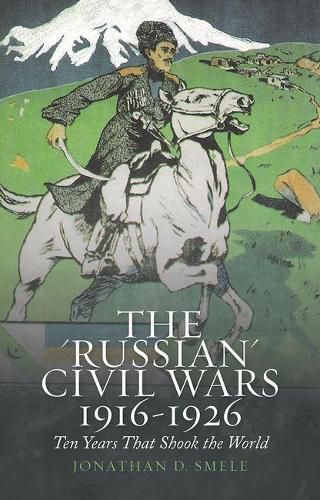Readings Newsletter
Become a Readings Member to make your shopping experience even easier.
Sign in or sign up for free!
You’re not far away from qualifying for FREE standard shipping within Australia
You’ve qualified for FREE standard shipping within Australia
The cart is loading…






This volume offers a comprehensive and original analysis and reconceptualization of the compendium of struggles that wracked the collapsing Tsarist empire and the emergent USSR, profoundly affecting the history of the twentieth century. Indeed, the reverberations of those decade-long wars echo to the present day - not despite, but because of the collapse of the Soviet Union, which re-opened many old wounds, from the Baltic to the Caucasus. Contemporary memorializing and ‘de-memorializing’ of these wars, therefore form part of the book’s focus, but at its heart lie the struggles between various Russian political and military forces which sought to inherit and preserve, or even expand, the territory of the tsars, overlain with examinations of the attempts of many non-Russian national and religious groups to divide the former empire. The reasons why some of the latter were successful (Poland and Finland, for example), while others (Ukraine, Georgia and the Muslim Basmachi) were not, are as much the author’s concern as are explanations as to why the chief victors of the ‘Russian’ Civil Wars were the Bolsheviks. Tellingly, the work begins and ends with battles in Central Asia - a theatre of the ‘Russian’ Civil Wars that was closer to Mumbai than it was to Moscow.
$9.00 standard shipping within Australia
FREE standard shipping within Australia for orders over $100.00
Express & International shipping calculated at checkout
This volume offers a comprehensive and original analysis and reconceptualization of the compendium of struggles that wracked the collapsing Tsarist empire and the emergent USSR, profoundly affecting the history of the twentieth century. Indeed, the reverberations of those decade-long wars echo to the present day - not despite, but because of the collapse of the Soviet Union, which re-opened many old wounds, from the Baltic to the Caucasus. Contemporary memorializing and ‘de-memorializing’ of these wars, therefore form part of the book’s focus, but at its heart lie the struggles between various Russian political and military forces which sought to inherit and preserve, or even expand, the territory of the tsars, overlain with examinations of the attempts of many non-Russian national and religious groups to divide the former empire. The reasons why some of the latter were successful (Poland and Finland, for example), while others (Ukraine, Georgia and the Muslim Basmachi) were not, are as much the author’s concern as are explanations as to why the chief victors of the ‘Russian’ Civil Wars were the Bolsheviks. Tellingly, the work begins and ends with battles in Central Asia - a theatre of the ‘Russian’ Civil Wars that was closer to Mumbai than it was to Moscow.